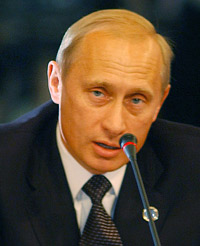Moscow showed precaution when accepting the announcement made by Armenian Foreign Minister Vardan Oskanyan about Yerevan discussing the possibility of joining the Trans-Caucasian gas pipeline. Certain Russian political activists perceived the minister’s announcement, which corresponds to the current world tendencies of keeping energetic security and diversification of resources, as a result of that, as betrayal on the part of Russia’s last ally in the South Caucasus. One of the most influential papers of Moscow even threatened the minister: “It’s possible to see Vardan Oskanyan regret for what he said.” As for Yerevan’s plans for gas, the paper observes the readiness to hurt Moscow’s economic interests.
Of course, it’s hard to imagine how a small country like Armenia can threaten Russia. The volumes of natural gas in Armenia (“GasProm” has increased the price up to 110 dollars per 1000 cubic meters) are equivalent to the volumes of gas used in 2-3 regions of Moscow. So, on a large scale, it’s ridiculous to say that Armenia can economically hurt its strategic ally.
That huge gas pipeline looks like the following on paper: Tengiz (Kazakhstan)-Turkmenbashi (Turkmenistan)-Baku-Tbilisi-Erzrum. This means that it doesn’t matter if Armenia’s name isn’t on the list; the gas pipeline will be constructed in any case regardless of Yerevan. So, Armenia can only buy gas from Central Asia (not from Azerbaijan based on self-explanatory reasons) and it’s possible that the gas will be at a lower price than what “GasProm” is proposing. But that still isn’t enough. Baku, which plays an important role in the project, has already declared that Yerevan is not allowed to participate in the project. “There is no plan to lead the gas pipeline route to Armenia and that is connected with the firm positions of Turkey and Azerbaijan on the Nagorno-Karabakh conflict resolution issue,” announced head of the press and political information department of the Azerbaijani Ministry of Internal Affairs Tayir Taghizade. So, Yerevan must think about constructing its own gas pipeline instead of trying to get gas from Kazakhstan and Turkmenistan. As to how realistic that is, it’s hard to say.
Experts are not too sure about that. That’s why they consider the minister’s announcement as non-perspective: there will be no gas from Asia and it may hurt Russian-Armenian relations. However, Moscow’s reaction shows its real attitude towards Yerevan. Here we can talk not about strategic cooperation, but better yet the attitude towards vassal. The “strategic cooperation” didn’t stand in the way of “GasProm” to raise the price of gas supplied to Armenia, letting it be not as much as Azerbaijan and Georgia pay for gas (230 dollars for 1000 cubic meters). However, taking into consideration the volumes of used gas of Armenia, “GasProm” could have left the price for its strategic ally unchangeable and not make Armenia look for other energetic resources, especially since Armenian-Russian relations are based on a new formula: establishments are handed in exchange for debt, but there are practically no establishments left in Yerevan. Perhaps that’s the reason why Moscow got angry at its “ally” when the latter started doing things its way. This is called neo-imperialism.

